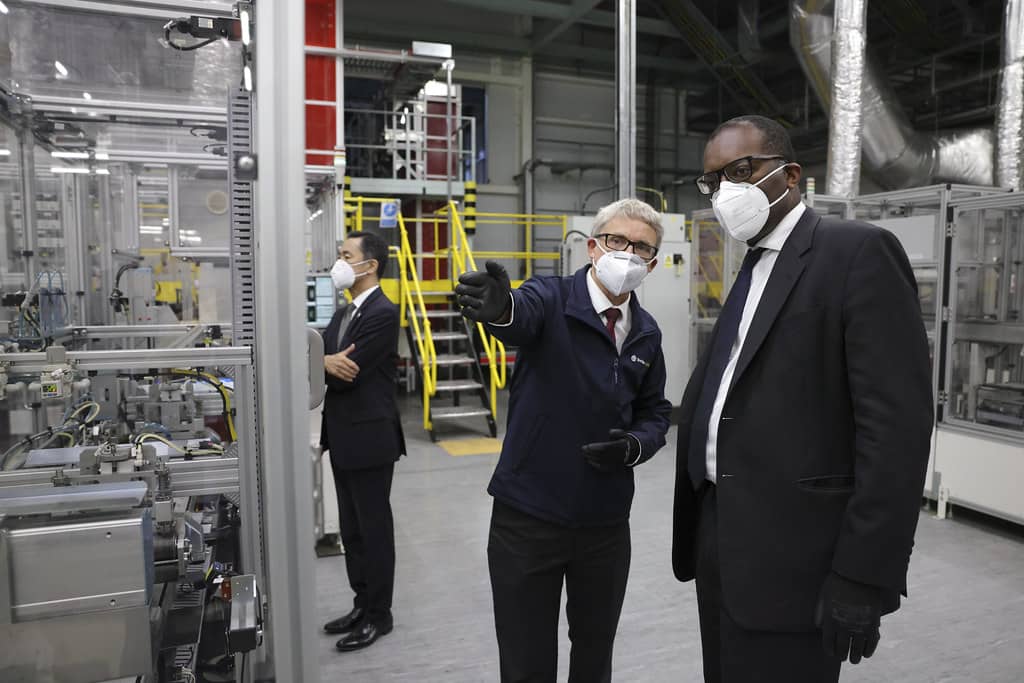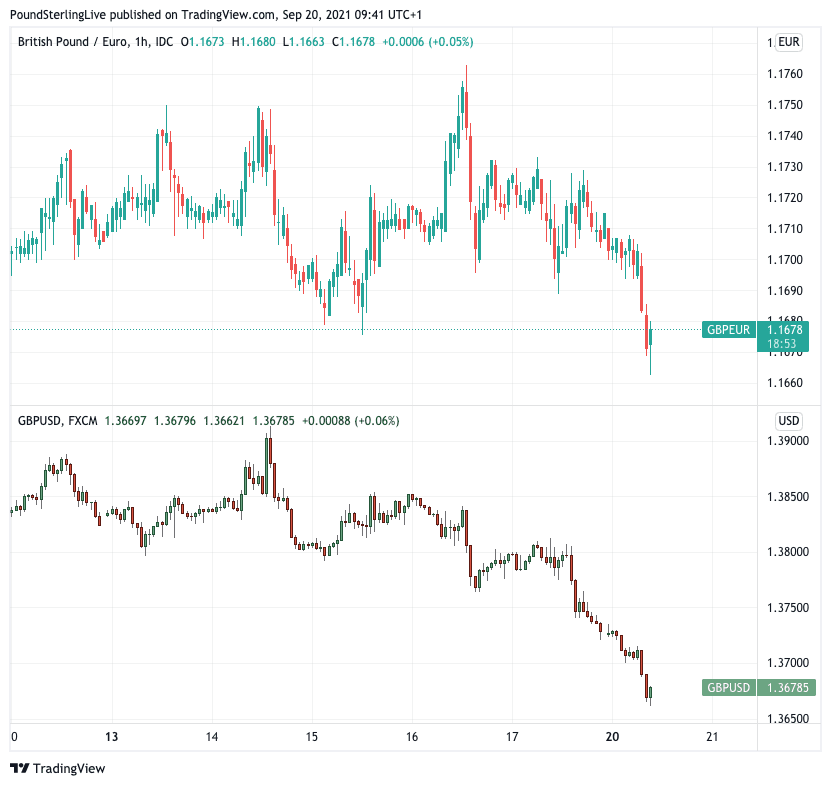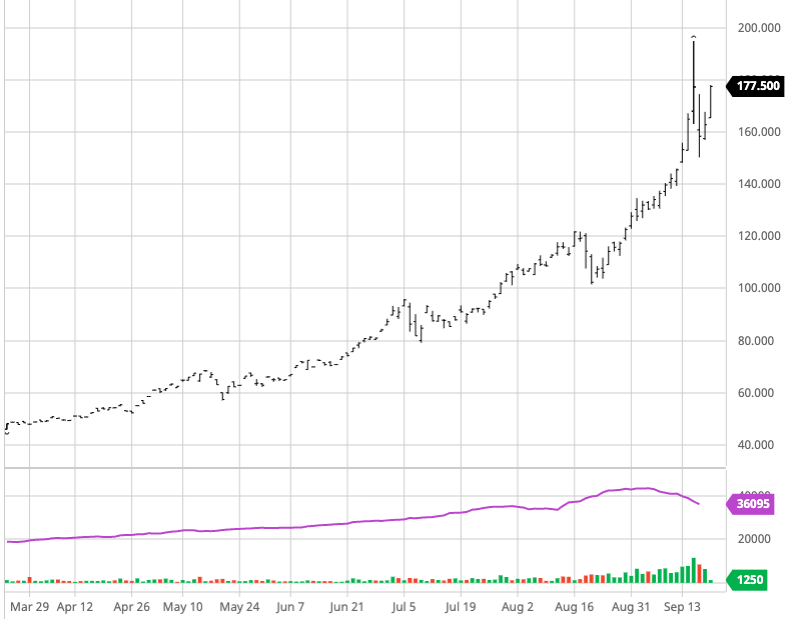Energy Crisis Hits Pound Sterling Exchange Rates
- Written by: Gary Howes

Above: Secretary of State for Business, Energy and Industrial Strategy Kwasi Kwarteng. Kwarteng is in talks to bailout energy firms.
- Market rates at publication:
GBP/EUR: 1.1682 | GBP/USD: 1.3675 - Bank transfer rates:
1.1455 | 1.3390 - Specialist transfer rates:
1.1624 | 1.3600 - Get a bank-beating exchange rate quote, here
- Set an exchange rate alert, here
Foreign exchange markets are in the grip of a 'risk off' moment at the start of the new week amidst rising fears the Chinese property sector will suffer contagion from the collapse of mega developer Evergrande, in addition to persistent fears of a global economic slowdown and a European gas crisis.
As a result the British Pound experienced notable declines against the safe havens of the Dollar, Yen and Franc, as well as the Euro.
The Pound-to-Euro exchange rate was seen trading a third of a percent down at 1.1673 while the Pound-to-Dollar exchange rate was lower by half a percent at 1.3666.
Above: 1-hour charts for GBP/EUR (top) and GBP/USD (bottom).
But the Pound was also down against those currencies that prove particularly vulnerable to 'risk off' events, such as the Australian, New Zealand and Canadian Dollars.
A typical global 'risk off' market would typically allow the Pound to advance against these names.
Its failure to do so suggests the market sees vulnerabilities peculiar to the Pound and validates a call made by analysts at Deutsche Bank last Thursday that the gas crisis was an all-out negative for the currency.
Domestic media are on Monday reporting the UK energy shock has left the government on the brink of providing a financial bailout to energy providers.
Kwasi Kwarteng, the Business Secretary, has had held several meetings with energy bosses over the weekend and they are expected to continue this week, amid warnings that dozens of companies could go bust.
A bail-out fund is one of several options on the table, with the industry fearing a financial crisis-style collapse according to the FT.
Above: ICE UK Natural Gas Oct '21 (NFV21), source: Barchart.
Secure a retail exchange rate that is between 3-5% stronger than offered by leading banks, learn more.
The largest energy suppliers are asking the government for substantial support to handle potentially millions of customers from failing companies and may require the creation of a "Northern Rock-style bad bank" to house customers they could not take on without losing money the publication says.
A global energy shock has left the UK particularly exposed given the country is a net importer of gas from Europe, which is already suffering its own gas supply crisis.
"The UK remains a net importer of fuels, running a small surplus in oil trade and a slightly larger deficit in natural gas," says Shreyas Gopal, Strategist at Deutsche Bank.
"The UK's reliance on imports has undoubtedly increased this year," he adds.
Deutsche Bank find higher-frequency estimates to indicate a deterioration in the UK's terms of trade is underway.
"Even before the material price surge over the past few weeks, UK energy production had already been suffering so far this year," says Gopal.
Deutsche Bank argues that an energy crunch in fact acts as a supply-side constraint to the economy which is effectively a negative input into Pound Sterling valuations.
"Like Brexit and Covid, the gas price surge represents another supply side shock that sterling is likely to attach a higher weight to than the rates market," says Gopal.
{wbamp-hide start}
{wbamp-hide end}{wbamp-show start}{wbamp-show end}
But the gas crisis is not just hitting utility companies.
Supermarket chains were reported to be trying to secure supplies of carbon dioxide after government talks with a big producer of the gas ended last night without a solution.
The Times says one company - CF Industries - alone accounts for 60% of the domestic commercial production of carbon dioxide and 40% of Britain’s fertiliser requirements.
(Carbon dioxide is a byproduct of fertiliser manufacture.)
Worries about empty shelves are increasing after operations at two fertiliser factories belonging to CF Industries in northern England, which play a key role in the production of carbon dioxide, were shut last week because of the rising price of natural gas reports The Times
The emerging supply-side shock to the economy comes ahead of Thursday's Bank of England policy meeting which is seen to be the highlight of the week for the UK currency.
The Bank of England could warn the developments could negatively impact growth and therefore give reason for the market to push back the timing of a Bank of England rate hike.
Such a move would in turn give FX investors reason to unwind exposure to the Pound.
"The direct negative impact on the UK's external accounts from the gas price increase could be notable, while any hawkish BoE reaction is only likely to dampen trend-growth and weigh on the UK's terminal rate," says Gopal.
The UK's domestic gas crisis comes amidst a souring in global market sentiment linked to a Chinese property developer, Evergrande.
Chinese and Hong Kong property groups were at the centre of a market slide on Monday that suggested a looming default at Evergrande was proving contagious.
Evergrande faces obligations of more than $300BN to creditors and other businesses, and a crucial interest payment deadline on its offshore bonds looms on Thursday.
Evergrande’s Hong Kong-listed shares fell as much as 18.9% on Monday.
Analysts at UBS say recent developments regarding Evergrande leave them to believe "a credit event seems unavoidable".
"The bottom line remains that the ability of Evergrande to generate sufficient liquidity in the near term through contracted sales and asset disposals has deteriorated considerably and in turn increased the likelihood of credit event occurring sooner rather than later," says Osmaan Malik, Analyst with UBS.
The market is waking from its summer slumber, and it seems the bears are in control and the British Pound is liable to remain under pressure until such a time investor confidence improves.







